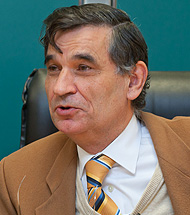Is there a scientific basis for philosophical views that oppose faith?
Ignacio Sols, Full Professor emeritus of algebra, directed a seminar organized by the group of research Science, Reason and Faith.

Ignacio Sols Lucia, Full Professor emeritus of algebra of the School of Mathematics of the Complutense University, was in charge of directing a new seminar organized by the group of research Science, Reason and Faith of the University of Navarra.
Christianity took over from Islam a mathematics fundamentally created by Greek antiquity and developed it until it became a descriptive model of the material reality, more and more adjusted. The only case of civil service examination of the Church to a scientific hypothesis, the Galileo case, did not have negative consequences for science but, on the contrary - and without intending it - it had positive ones. And no other is known.
The historical balance of the Church's relations with science, for and against, is very favorable. It is not that science proves faith: God is not properly the object of science, He does not appear among its assertions in any case. But the congruence of scientific results with the contents of revelation is overwhelming. For example: the absence of determinism in the behavior of the subject, and the dating of the world at 13.76 billion years, when long ago it was held that it was eternal. Why, then, is it believed that Christianity has always been a hindrance to science? And from the other point of view, why is it believed that faith is threatened by the advance of science?
Today we can also observe the decline in the issue of young people who choose to do programs of study of a purely scientific nature. Talent is often directed towards "more productive" careers. Professor Sols proposed some ideas to arouse vocations for science, and to change that erroneous perception of broad sectors of the current culture expressed in the previous questions. He emphasized the importance of Education, and the importance of enthusiasm in secondary school teachers. The important work of these professionals must be revalued. "Today we are facing a youth that, as Popper already announced, begins by despising Philosophy, and ends up despising Science itself", he affirmed.
